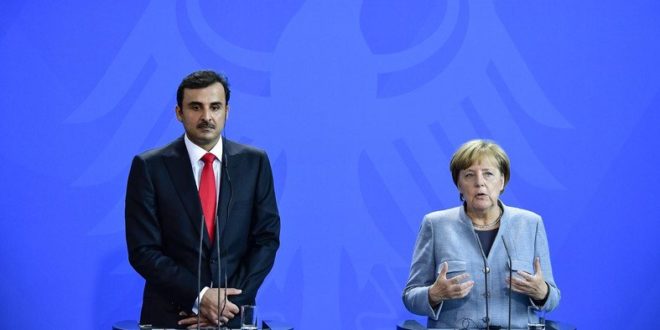Shehab Al Makahleh •
Qatar Emir Sheikh Tamim bin Hamad Al Thani’s visit to Ankara, before he headed to Berlin and Paris on his way to New York for the United Nations General Assembly meetings, sent several political signals and messages.
One of the messages was directed toward Qatari people and to the Qatari opposition conference, which was held in London on September 14, that the regime in Doha remains strong.
The second message aims to seek assistance from Turkey as a strategic partner, along with Germany and France as mediators. In other words, Qatar is now looking beyond Turkey and reaching out to Germany and France to seek support.
The late announcement by the Turkish presidency of Tamim’s visit indicates that it was not planned or was not on the agenda. It was a result of the 148th foreign ministers’ ordinary session at the Arab League Council’s inauguration on September 13 which was not a cordial coming together of Qatar with Saudi Arabia, the United Arab Emirates, Bahrain, and Egypt.
In fact, Qatari Minister of State for Foreign Affairs, Sultan bin Sa’ad Al Muraikhi, made a provocative remark when he referred to Iran as an “honorable state”.
Tamim seeks from Turkish President Rejeb Teyyep Erdogan further economic, military, political and security support for Doha, especially after the Emir’s visit to Al Udeid Airbase where he inspected a number of combat aircraft, helicopters and transport aircraft in addition to air military pieces and vehicles.
On his Al Udeid visit, Tamim focused on the air operations plan and tasks and duties of the Qatari Air Force. Over10,000 American troops are stationed at Al-Udeid base in Qatar. From a Turkish perspective, the current crisis between Doha and other countries is a precursor to a changing reality in the Gulf, as anomalous political polarization is shaping the region with Turkey developing warm ties with Qatar over the past few years.
Turning ‘peacemaker’ in Europe
The visit of Tamim to Germany and his meeting with German Chancellor Angela Merkel aims to orchestrate German support for Qatari stand in lieu of Tamim’s role toward reconciling current tense ties between Erdogan and Merkel. The German Chancellor had recently said she would support the end of Ankara’s membership talks with the European Union.
Ankara and Berlin have been at odds with each other, particularly since the July 2016 coup attempt in Turkey and Erdogan’s several calls to citizens of Turkish origin in Germany not to vote for Merkel’s Christian Democratic Union or other major parties in the country, which described them as “enemies of Turkey”.
Tamim is also trying to profit from Turkey’s animosity with some countries in the Middle East and in the EU. The Qatari regime wishes to exploit differences between Ankara and Berlin to eke out more concessions and support from them over the “Qatari dispute” with Arab countries. Thus, Tamim is trying to resolve Qatar’s issues with the GCC states by offering to solve the problem of other countries.
The ideological agenda
It should be noted that relations between Qatar and Turkey have been steadily improving over the last 15 years with both countries having shared investments and signed military training deals. However, it is the UAE and not Qatar that is a major investor in Turkey.
Still, Qatar’s investments amount to $20 billion and the volume of investments of Turkish companies operating in Qatar stands at $11.6 billion. The volume of Turkish trade with Qatar has reached a record high of $1.7 billion and is expected to exceed $2 billion in light of the growing cooperation between the two countries.
Meanwhile, Turkey’s stance does not align with the position of the UAE at present. So the economic and investment dynamic should not be considered the major driver for Ankara’s support to Qatar. The reason is the ideology of both countries that favour the Muslim Brotherhood and their collective strategies that have an impact on countries of the Middle East.
The visit of the Emir of Qatar to Turkey coincided with the arrival of the Kuwaiti Prime Minister Sheikh Jaber Al-Mubarak to Turkey at the official invitation of the Turkish premier Benali Yildirim. There is no indication that there was any prior coordination by any party to meet or hold a tripartite meeting to discuss developments in the region and the Gulf crisis.
In particular, the Kuwaiti prime minister’s visit was scheduled for four days and aimed to enhance bilateral cooperation in the economic fields. On the sidelines of the visit, the Turkish-Kuwaiti Economic Forum will be held in Istanbul.
________________________
Shehab Al-Makahleh is Director of Geostrategic Media Center, senior media and political analyst in the Middle East, adviser to many international consultancies. He can be reached on Twitter @shehabmakahleh and @Geostrat_ME.
 Geostrategic Media Political Commentary, Analysis, Security, Defense
Geostrategic Media Political Commentary, Analysis, Security, Defense





